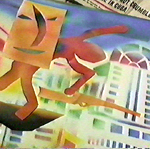LATINO MIDWEST VIDEO COLLECTIVE -- CATALOG (1985-2010)

Latino Midwest Video Collective (LMVC) was originally founded by Adriana Zuanic (Chile), Joe Castel (Xicano), Carlos Rojas-Cardona (MX/USA), Olivero Rivera Davila (Puerto Rico), Jacqueline Rangel (Venezuela) and critically acclaimed interdisciplinary media artist Raul Ferrera-Balanquet (Raul Moarquech) when they were studying film and communication at the University of Iowa in the early 1980s. Film historian Ana M. Lopez, then completing her Ph.D, was a major influence in the foundation of the collective. Lopez was Zuanic and Ferrera-Balanquet's academic adviser at the film school and, when they took her Latin American Cinema class, Ferrera-Balanquet invited them to form the group. It was under Ana M. Lopez's guidance that the collective organized the Latin American Film Festival and Conference in Iowa II in 1986, which trained Ferrera.Balanquet as a curator.
Even though they worked in each other films as crew and actors, most of the early works of the collective explored the migration trajectory of Ferrera-Balanquet, one of the most dynamic Cuban-born interdisciplinary media artist alive today, who was engaged in the reconstruction of the Cuban landscape, investigating the historical period between 1960-1980 and his experience after arriving to the United States. The works map and reconstructs a multi- directional journey; the socio-cultural and political concerns of the artist, as the videos unfold the complexity of the US Latina/o realities.

Ferrera-Balanquet´s aesthetics and politics concerns conducted the production of LMVC toward the representation of issues such as immigration, mestizaje, cultural identity, and sexual desire. In 1989, the collective open its branch in Mérida, Mexico incorporating theater directors, actors, musician, painters and writers such as Enrique Cascante, Aaron Villanueva, Ariel Mendez Yerves, Melba Alfaro, Santos Piste, Cristina Leirana, and Elizabeth Matu. Yucatecan writer and critic Jorge Lara Rivera writes in La miel de la memoria en tres deslumbramientos: "La temática de esos videos no podía ser menos complaciente: amor y sexualidad alternativos, la condición femenina marginada, el execrable racismo y su violencia contra la etnia maya, la informalidad cotidiana y sus prácticas sin urbanidad de habitantes de ciudad contradictoria e hipócrita, la necesidad del amor… Tales condiciones exigieron a su vez un replanteamiento del instrumental crítico para el abordaje de sus resultantes, un enfoque semiológico pero también multidimensional para su análisis y comprensión. Ello constituyó un desafío enriquecedor para la crítica local al distanciarla de sus paradigmas convencionales (Lara, 2007).
The violent clashes of the personal experiences of the members against the sociological landscape of Cuba, the United States and Mexico brought the audiovisual discourse of the collective to a historical level, tracing a composite portrait of the diverse communities where the artists found their ancestral and communal roots. The works of the Latino Midwest Video Collective emphasizes the narrative and stylistic devices employed by the subjective narrator to articulate a personal audiovisual discourse that connects to sociocultural and political situations, marking the importance of understanding our placement within the historical coordinates mapping the territories we inhabit.
The collective reaffirms that a decolonial process of liberation not only takes places at the economic, political and social levels, but deeper in the subconscious where the reconstruction of the experiences allow us to free ourselves from the oppressions stored in our bodies and the euro patriarchal modern colonial matrix.
Latino Midwest Video Collective -- Catalog
| 1980s | 1990s (early) | 1990s (mid) | 2000s |
|---|---|---|---|
| Iluminando las Aguas (1986) | Merida Poscrita (1990) | Las Cosas que El me Hizo Hacer (1994) | Requiem Para un Querubin (2001) |
| Experiwalking (1987) | Rompecabeza (1990) | Huellas de Mar (1994) | Doña Diabla (2009) |
| Encuentro (1988) | Paraiso Yucateco (1991) | Ancestros (1994) | La Vida que Nunca Fue (2010) |
| Traigo un Cantar (1988) | We Are Hablando (1991) | Olufina Abuela Balanquet (1994) | |
| In Search of Our Voices (1989) | Ebbo For Elegua (1992) | No Me Olvides (1995) | |
| Sucesos del 22 (1992) | Caminamos Sobre Las Olas (1992) | Sunny Clouds at the Crossroads (1996) | |
| Resistencia (1992) | PD Digital (Net Art, 1998) | ||
| Cities of Lust (1993) | |||
| Pulsaciones (1993) |
Comments
On a regional level, groups such as Cine Acción (San Francisco), Latino Collaborative (New York), Latino Midwest Video Collective (Chicago), and Latino Writers and Filmmakers of the 1990s (Los Angeles) have provided technical support, non-broadcast distribution, re-granting, and other services to independent film and videomakers.
... and Raúl Ferrera-Balarquet, a University of Iowa film school graduate whose MÉRIDA PROSCRITA (1990), WE ARE HABLANDO (1991) and NO ME OLVIDES (1992) offer poignant analyses of the difficulties and marginalization of gay Latino life in a North-South context.
Raul Ferrera-Balanquet, who emigrated to the United States as a part of what has been called the Mariel boat rescue operation in the early 1980s, formed the Latino Midwest Video Collective as a workshop and support network so that Latino media artists studying at the University of Iowa could share ideas and resources.1 The collective's manifesto, authored by Ferrera-Balanquet, explains that "the textual construction of some of our videos ... takes as a point of departure the socio-political, psycho-sexual and economic set of relations in Latino culture, allowing us as Latino videomakers to critique elements of the world in general as well as those relations that work specifically within our culture"